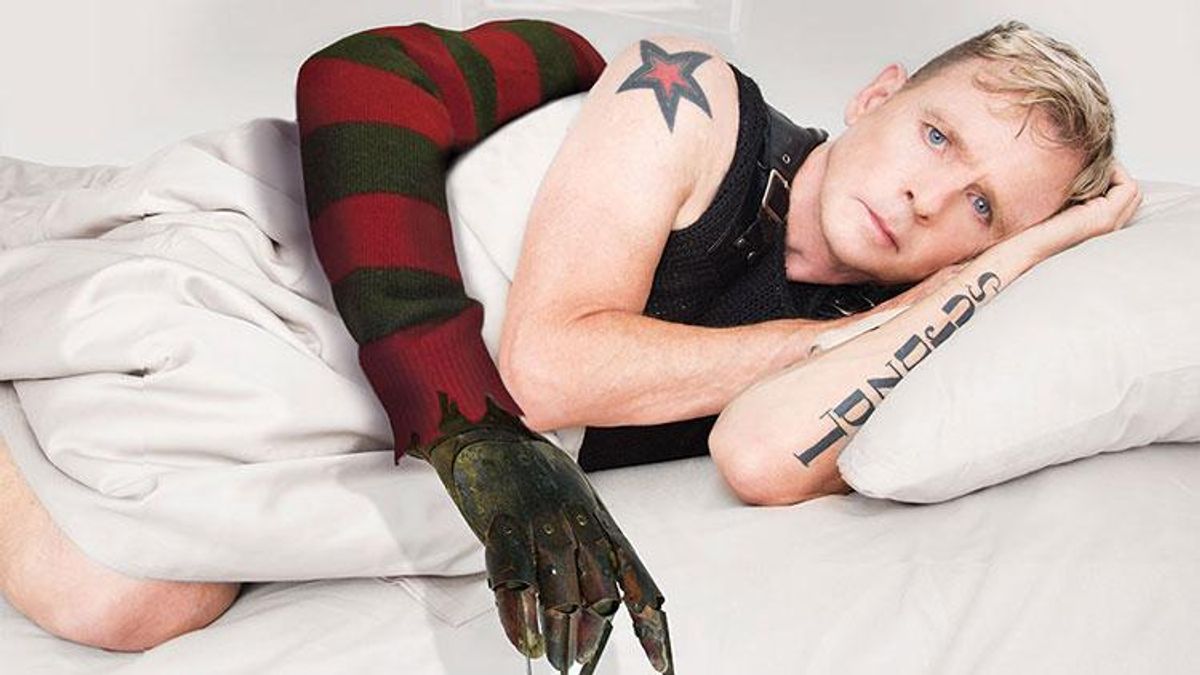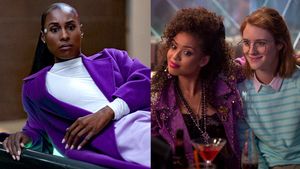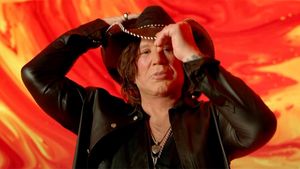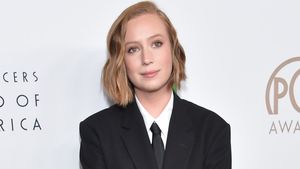For actor Mark Patton, being cast in the lead role in the 1985 sequel to A Nightmare on Elm Street was supposed to be his big break in Hollywood. Instead, A Nightmare on Elm Street 2: Freddy's Revenge -- and the backlash to the overt gay subtext involving his character, Jesse, added by screenwriter David Chaskin -- forced Patton to quit acting in his early 20s.
However, Patton's story -- and the story of Freddy's Revenge -- did not end there. A new documentary, Scream, Queen! My Nightmare on Elm Street, fleshes out how the film that was once reviled by antigay Freddie fans has grown into a horror classic. In modern times, the film's queer subtext has been embraced by audiences, with Patton himself emerging as a gay icon.
Directed by Roman Chimienti and Tyler Jensen, Scream, Queen! traces this history of Freddy's Revenge, as well as Patton's own remarkable journey: his move to New York City as a teenager; his casting opposite Cher in Come back to the Five and Dime, Jimmy Dean, Jimmy Dean; his exile from Hollywood after his Elm Street role; his move to Mexico where he found love; and his return to horror conventions as celebrated pioneer.
The film's climax is a dramatic sit-down confrontation with Chaskin -- who once blamed Patton for the queerness in Freddy's Revenge, and then took ownership of it after fans and film scholars began to laud it.

For Patton, Scream, Queen is in part a "testimony" of an actor's experience with homophobia in Hollywood and the systemic forces that keep actors closeted. (The Advocate reached out to Patton for an interview in 1982 when Five and Dime was on Broadway; Patton was interested, but the opportunity was shot down by his representatives.)
"I was forbidden to do any gay press. The agent said, 'Well, they'll ask you if you're gay, and you being you, will say yeah. And then that'll be that,'" Patton recalled. "Having this conversation with you all these years later is a huge victory for me."
Patton, now 60, was reticent to participate in a documentary where he was the primary focus. Initially, he wanted to make a film about the young men he knew who had "disappeared" from Hollywood in the 1980s. "They were either gone because they had died, or they were sick, or they tried to come out and they were run out of the business," Patton said. "The boys who stayed in the business went deeply into the closet."
Even today, Patton -- who has returned to acting at long last with films like 2017's Amityville: Evil Never Dies and the upcoming 1 Dead Dog -- detects an ongoing and pervasive antigay bias in Tinseltown. He pointed specifically to "casting directors, agents, managers, who in many cases are homosexual themselves, and they advise their clients not to come out -- out of fear."
"It's a really terrible business, just by nature of what it is," Patton said of the entertainment industry. "It's so competitive and the rewards are so high that people will really do anything to get to where they're going, or strangely enough to stop somebody else from going because they feel like they're taking their place."
However, Patton is also an "eternal optimist" who sees hope for Hollywood. He mentioned by name gay showrunner Ryan Murphy, who "put his money where his mouth is" by co-creating shows like Pose that put transgender women of color front and center. The process of shining a light on people who had never been illuminated will only continue to help the entertainment industry, Patton reasoned.
"If you give a drag queen a piece of cardboard and some string, the drag queen's going to give you a runway show," he said. "When you move marginalized people to center stage, I think you're going to see some fabulous art explode."
For these reasons, Patton realized his own story was essential to tell -- as he himself has stepped back into the limelight. As depicted in the documentary, the actor, in addition to receiving new acting opportunities, is invited to seminars, conventions, and gay bars all over the world to share his story. He's even preparing a TED talk. Robert Englund -- the actor who played Freddie Kreuger -- advised Patton to take every opportunity and "go to everything." This includes a centerpiece screening Monday at NewFest, New York's LGBTQ film festival.
However, Patton also sees Scream, Queen! as an important historical document. In addition to Patton's experiences, the film dives deep into the burgeoning LGBTQ rights movement and the AIDS crisis of the 1980s. Patton is HIV-positive; he came out about his status in an award-winning interview with Plus, The Advocate's sister magazine, in 2013. In addition to being an actor, he is an activist, and it was important for him to showcase these movements by using his own story as an access point.
"I'd like to see [the documentary] taught in schools," said Patton, who recounted the many Freddie fans who had come to see Scream, Queen! expecting horror and been pleasantly surprised to receive a history lesson in LGBTQ rights. "It's all packaged in there in a really sweet way where you don't really feel like you're being fed your vegetables, but you definitely are."
These "vegetables" are particularly essential in an era when LGBTQ rights and the freedoms of other marginalized communities are under siege.
"I always say, 'I'm trying to teach you history so that you're fully armed. Should protease inhibitors stop working, I want you to know how to take care of yourself. And should politics turn, I want you to know how to take care of yourself," said Patton.
The actor is of course no fan of the current administration, but he still maintains high hopes for the future of the United States. He praised the Democratic presidential candidates; the actor loves Sen. Elizabeth Warren in particular, but "I don't care who it is as long as they win" in an election against President Trump, he said.

Patton has been heartened by the reactions he's received to the documentary while touring around the country. "I didn't know I needed to see this film, but it's just really everything," an older woman told Patton at one of the recent film festivals that screened Scream, Queen! Patton said the Q&A experiences on this circuit have been "electric" because of these different cross-sections of communities and conversations within the audience: young people, old people, LGBTQ people, horror fans, liberals, and conservatives.
And for Patton, who has come to embrace his role as the first male scream queen and "Nancy boy" -- a tongue-in-cheek reference to the original Elm Street lead -- the documentary has also been an education. He recalled an eye-opening experience of watching footage of himself during the editing process and thinking, "Oh my God, I looked like such a fag." The horrific thought made forced him to confront the biases he had been harboring throughout his life. "I didn't really realize I had been carrying that for so long," he said.
When he was a young actor, "I didn't like my voice. I didn't like the way I walked or the way I moved my hands. I had to cover those mannerisms for so long," said Patton. He recounted the surreal experience of audition rooms, where he would have to put on an added performance as a "straight" actor in front of casting agents to hide the aspects of himself that he hated.
The process of making Scream, Queen! -- and watching YouTube videos of the fashion designer Jonathan Anderson, who shares many of Patton's mannerisms -- allowed him to overcome this internalized stigma.
"It was a real epiphany for me to just let go and be myself and be who I really am and not be afraid of it," he said. "I've taken that mantra and I'm enjoying it. I'm really allowing myself to be me -- maybe the first time in my life really."
To conclude his interview with The Advocate, Patton told one last story of how, when he was 20, his friends hired a fortune teller for his birthday party. In this mystic meeting, which was before the AIDS crisis, she delivered a message that he would never forget.
"I know what you want me to say. You want to know how famous you're going to be and how many autographs are going to sign," the woman told him. "And you are going to be famous and you are going to sign autographs. But that's not what your life is going to be about. All of your friends are going to die ... and you're going to live through it. And your karma is to be a witness to what is about to happen."
"Now I'm 60 years old and I'm standing in theaters all over the world telling the story. And I am a witness," Patton concluded. "I'm a witness to what happened in 1985. So I think, ultimately, it was all meant to be."
Scream, Queen! My Nightmare On Elm Street screens Monday, October 28, 8:45 p.m. at SVA Theatre in New York City. Watch the trailer below.




















































































Fans thirsting over Chris Colfer's sexy new muscles for Coachella